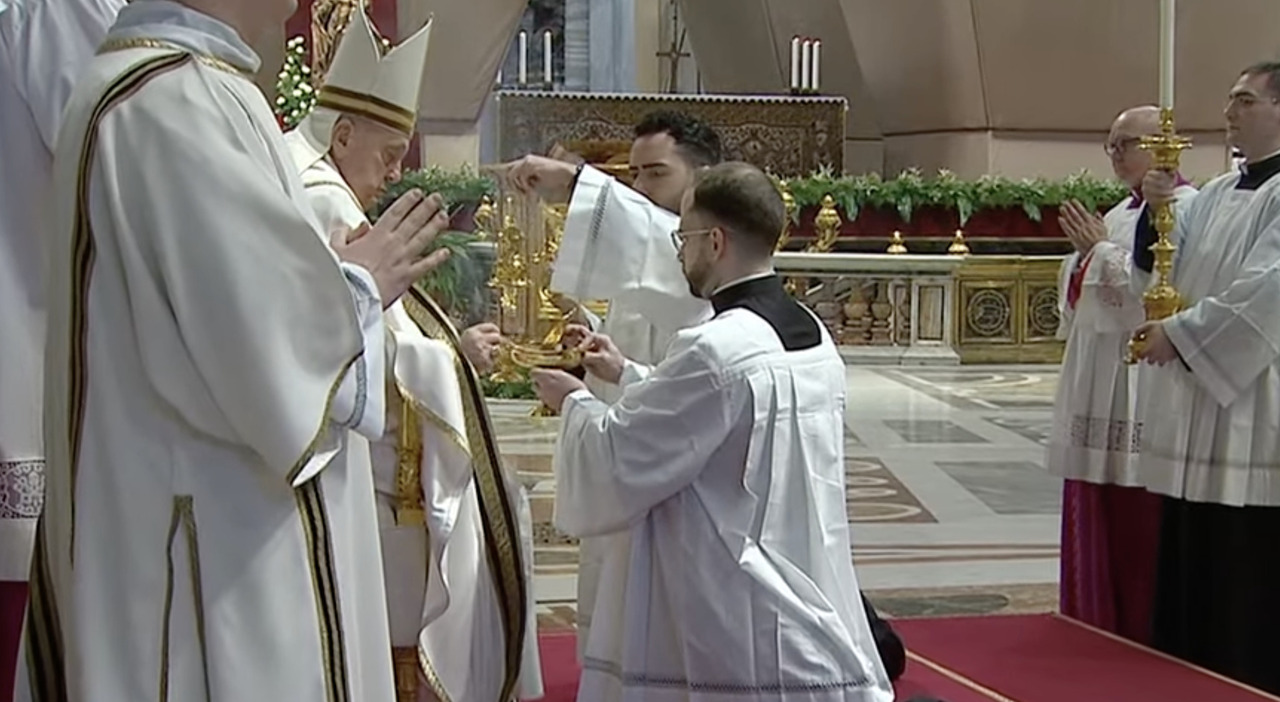Thursday 28 March 2024, 10:05
Pope Francis under the spotlight: with the Chrism Mass celebrated in the Vatican basilica, he has initiated the most intense liturgical period of the year, one that concentrates long and exhausting rites, culminating on Sunday with the Easter Mass in St. Peter's Square. All eyes are on his health after last Sunday's lapse during the Palm Sunday ritual, when he skipped the homily without giving any explanation, probably to shorten his stay in the square on a windy and cold day. In the following days, he appeared stronger, in clear recovery so much so that he was even able to walk for a short distance without the aid of an assistant and read long speeches in full. However, fears for the eighty-seven-year-old pontiff remain in the background. For him, the troubles of these months are not exclusively linked to his physical state that has long sent the Vatican curia into a frenzy: the internal rift within the Church caused by the most divisive and problematic document that has been issued in the last fifty years, the Fiducia Supplicans, the declaration that has given the green light to all parish priests and bishops around the world to bless gay couples and, for this reason, has caused an unprecedented reaction from entire episcopates determined not to follow the Vatican directives, defining them as an act against sacred scripture, tradition, the magisterium. For some cardinals, that text developed by the Dicastery for the Doctrine of the Faith and by the faithful Argentine cardinal Fernandez behind papal approval borders on heresy.
Pope Francis on April 28 in Venice for the Biennale: six hours full of speeches, meetings, movements (also by motorboat).
In the Chrism Mass in which the holy oils that will be used then during the year for various sacramental celebrations are blessed, Pope Francis seems to acknowledge the 'controversies' that shake the ecclesial body. And to the priests present, he provides some reflections borrowed from the 'Imitations of Christ', a famous text followed for centuries by legions of clerics. The Pope asks not to give 'disdainful judgments on those who do not believe, but love and tears for those who are far away. The difficult situations we see and live, the lack of faith, the sufferings we touch, in contact with a contrite heart do not arouse resoluteness in controversy, but perseverance in mercy.'
A phrase that, while not contextualized specifically within the controversy over gay couples, can very well be read also in that key. 'How much we need to be free from harshness and recriminations, from selfishness and ambitions, from rigidity and dissatisfaction, to entrust ourselves and entrust to God, finding in Him a peace that saves from every storm! Let us adore, intercede and weep for others: we will allow the Lord to perform wonders. And let us not fear: He will surprise us! Our ministry will benefit. Today, in a secular society, we run the risk of being very active and at the same time feeling powerless, resulting in losing enthusiasm and being tempted to give up, to close ourselves in complaint and let the greatness of the problems prevail over the greatness of God. If this happens, we become bitter and biting,' states Francis in the homily he prepared and reads without problems. 'But if instead bitterness and contrition are directed, not at the world, but at one's own heart, the Lord does not fail to visit us and raise us up. As the Imitation of Christ urges: 'Do not carry the affairs of others inside you, do not even meddle in what the most prominent people do; rather always and foremost watch over yourself.'
As every Holy Thursday in the afternoon, Francis will be at Rebibbia, in the women's section of the prison, to celebrate the Mass of the Lord's Supper with the traditional foot-washing ritual to twelve female inmates who symbolize the apostles. This is the Last Supper that Jesus held with his apostles before the arrest and death sentence. All four Gospels report that Jesus, as the feast of 'Unleavened Bread', that is, the Jewish Passover, was approaching, sent some disciples to prepare the table for the ritual dinner, in the house of a follower.
The blessing to gay couples is now a low-intensity conflict, a theologian scholar of Saint Therese rejects the document.
© ALL RIGHTS RESERVED
This article is automatically translated
